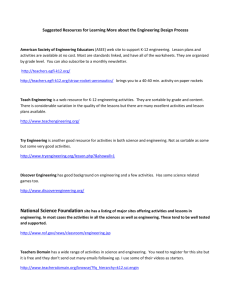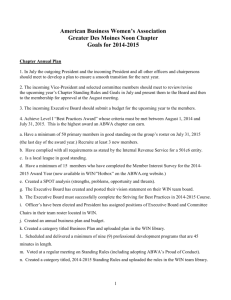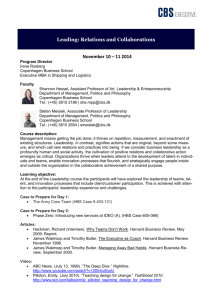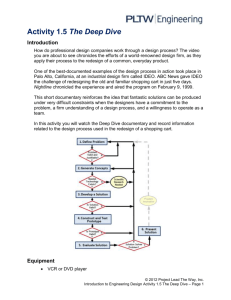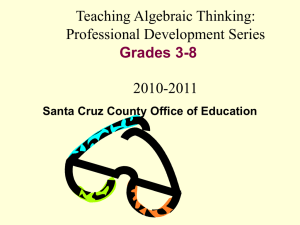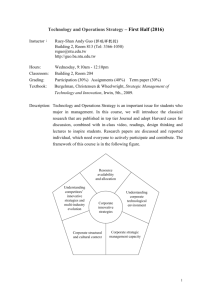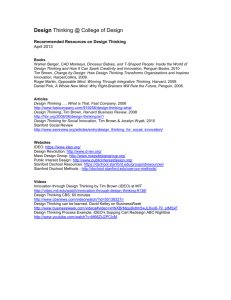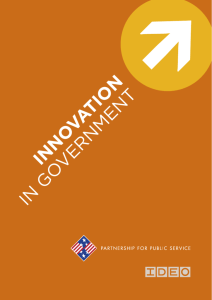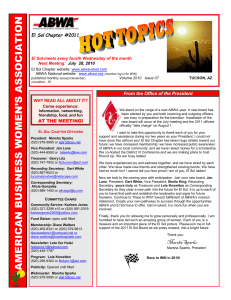A Powerful Conception: Idea - Prairie Sage Instructional Writing
advertisement
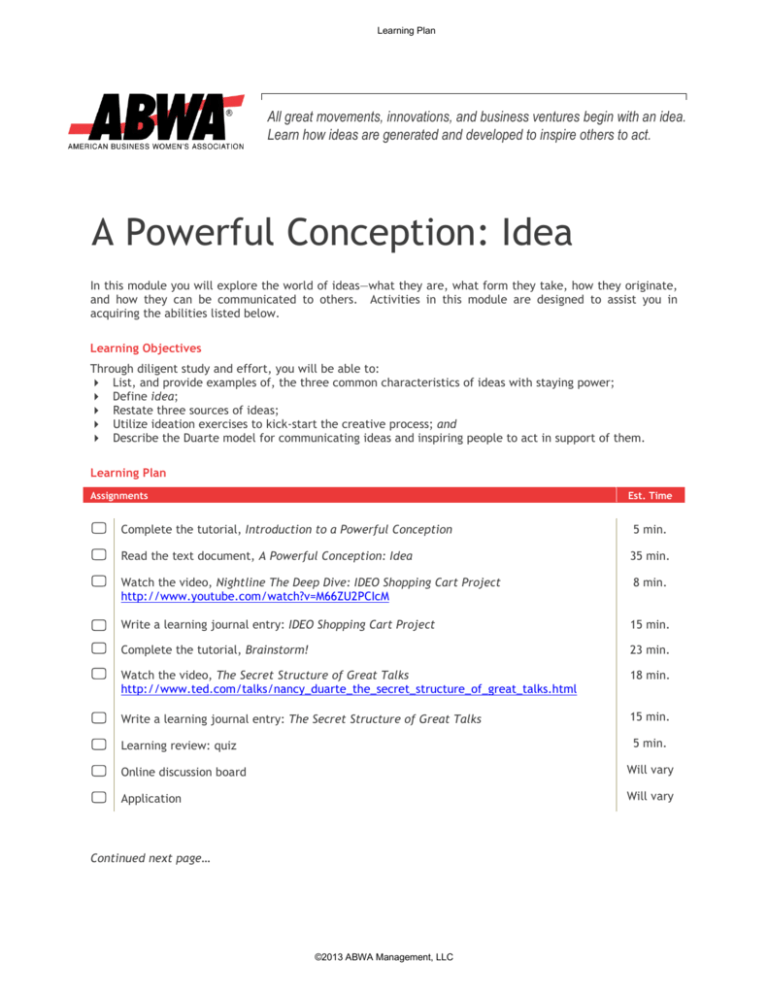
Learning Plan All great movements, innovations, and business ventures begin with an idea. Learn how ideas are generated and developed to inspire others to act. A Powerful Conception: Idea In this module you will explore the world of ideas—what they are, what form they take, how they originate, and how they can be communicated to others. Activities in this module are designed to assist you in acquiring the abilities listed below. Learning Objectives Through diligent study and effort, you will be able to: List, and provide examples of, the three common characteristics of ideas with staying power; Define idea; Restate three sources of ideas; Utilize ideation exercises to kick-start the creative process; and Describe the Duarte model for communicating ideas and inspiring people to act in support of them. Learning Plan Assignments Est. Time Complete the tutorial, Introduction to a Powerful Conception 5 min. Read the text document, A Powerful Conception: Idea 35 min. Watch the video, Nightline The Deep Dive: IDEO Shopping Cart Project http://www.youtube.com/watch?v=M66ZU2PCIcM 8 min. Write a learning journal entry: IDEO Shopping Cart Project 15 min. Complete the tutorial, Brainstorm! 23 min. Watch the video, The Secret Structure of Great Talks http://www.ted.com/talks/nancy_duarte_the_secret_structure_of_great_talks.html 18 min. Write a learning journal entry: The Secret Structure of Great Talks 15 min. Learning review: quiz 5 min. Online discussion board Will vary Application Will vary Continued next page… ©2013 ABWA Management, LLC Learning Journal Assignments About Learning Journal Entries Your learning journal is intended to serve as an archive of your experience in this course. It is the place to store your notes, reflections, and assigned learning journal entries. On some occasions you might be asked to share contents of your journals either with your instructor, or in discussions with other students. However, its principle purpose is to capture and hold key learnings you want to retain and apply later on, and to assist you in preparing for the final exam, if applicable. Learning journals can be as fancy as cloth-bound diaries, or as informal as spiral notebooks or three-ring binders; it doesn’t matter. The learning journal can take any form you like. Unless otherwise noted, assigned learning journal entries are free-flow writings in which you address a topic or topic for 15 minutes. To help you begin thinking about your subject, reflection questions are provided. Take a moment to reflect on the question or questions, then respond in writing. You don’t have to worry about writing like a poet; your objective is simply to think, on paper, about the subject of your learning, what it means to you, and how it connects to your pre-existing knowledge. Learning Journal Entries in this Module 1. IDEO Shopping Cart Project (Before writing, watch the video, Nightline The Deep Dive: IDEO Shopping Cart Project) Choose any one of the reflection questions below to address in your journal: 2. A What are some defining characteristics of IDEO’s process for generating and developing new ideas? How is their process similar to, or different than, the process applied in your organization? B One of IDEO’s mantras is “Enlightened trial and error succeeds over the planning of the lone genius.” What does this really mean, and do you agree? Why or why not? C What role do the following play in the ideation process: time constraints, temporary autocracy, prototyping, user-based research? D The shopping cart project was completed in 1998, yet despite its sleek design and cool features, it doesn’t seem to have caught on, judging by the continued proliferation of traditional carts. Why do you think this is the case? If you were responsible for “selling” this concept to grocery store buyers, how would you do it? The Secret Structure of Great Talks (Before writing, watch the video, The Secret Structure of Great Talks) Sketch an idea you have for a new product, a new business idea, a new ABWA group initiative, or a new solution to a problem in your life or in the world. Using Nancy Duarte’s model as a guide, try to describe your idea in terms of contrasts between what is and what could be, culminating in the “new bliss” of your idea fully realized. Note: You may be asked to share your idea with others online. ©2013 ABWA Management, LLC 2 Online Debriefing About Online Debriefings This module may be a self-study, but you are not on your own! You are a member of a community of learners, each of whom is exploring this topic right along with you. Once you have completed all of the assignments in this module, visit the WIN discussion board to engage with your colleagues, share insights you had through your study, explore further—through discussion—topics introduced in this module, and mentor each other. If you have never participated in an online “threaded” discussion, here is what you need to know to get started. Threaded discussions are not live. Rather, they are boards that you can post comments to at any time. Discussions are not moderated, but are guided instead by the needs and interests of the group. Lively threaded discussions are those in which participants post original comments, but also react to the posts of others, ask and answer questions, and elaborate on ideas that have already been presented. If you are the first to post to a discussion, or if you just want to steer the current discussion in a new direction, use one or more of the discussion “Starters” listed below. Have fun! Starters Share an insight that you recorded in your learning journal. This insight could be an “aha!” moment, a memory that was jogged by something you read, a new skill you are anxious to try out, or a personal experience you have had with one of the concepts presented in the module. Several stories of how ideas were developed and communicated were presented in the text for this module. Share which one(s) you found to be most inspirational or surprising. Was there anything presented in this module that you disagreed with? That would be particularly difficult to apply? That seems unlikely to work? Share your thoughts and state your case. How might you enhance the key messages? Describe how you could apply the brainstorming techniques developed by IDEO within your ABWA group. What would be the objective of the exercise? How would it work? What kinds of ideas would you hope to generate? If you have an opportunity to put IDEO’s methods to the test in your ABWA group, share your results on the discussion board. How did members respond? What was the group able to produce? What’s next? Share the idea that you sketched in your journal after watching the video, The Secret Structure of Great Talks (Assignment #2). Walk your colleagues through how you would communicate your idea by describing to others the contrasts between what is and what could be. What is the new bliss that could be achieved through implementation of your idea? ©2013 ABWA Management, LLC 3 Application About Applying what you Learn As an ABWA member, you have access to a ready-made laboratory in which to practice new skills, test new abilities, and refine new techniques: your chapter, network or group! After practicing skills in this module, share your results with your colleagues on the discussion board for this module. Practice For your next group meeting, plan a brainstorming session in which members try to develop a solution to one of the following problems: • • • • • • • Lack of cohesiveness or shared purpose among members of the group. Inability to attract new members or retain existing members. Difficulty in countering competitive forces such as social media, time constraints, economic difficulties, etc. that may be drawing women away from your group. The challenge of remaining relevant to the new generation of professional women. Difficulty in locating and securing qualified speakers on emerging issues of interest to professional women. Gap in technical skills among group members and the need for technology to establish a presence on the Web and in social media. Any other immediate problem your group may be facing. ©2013 ABWA Management, LLC 4
